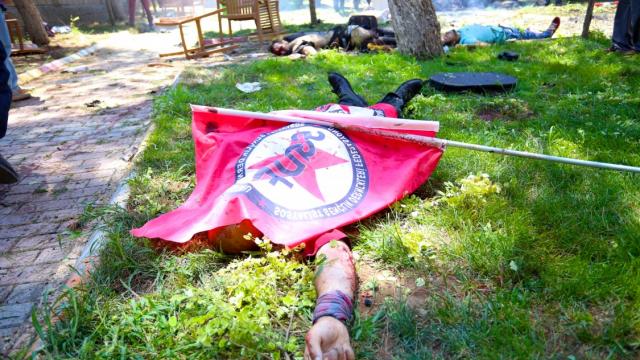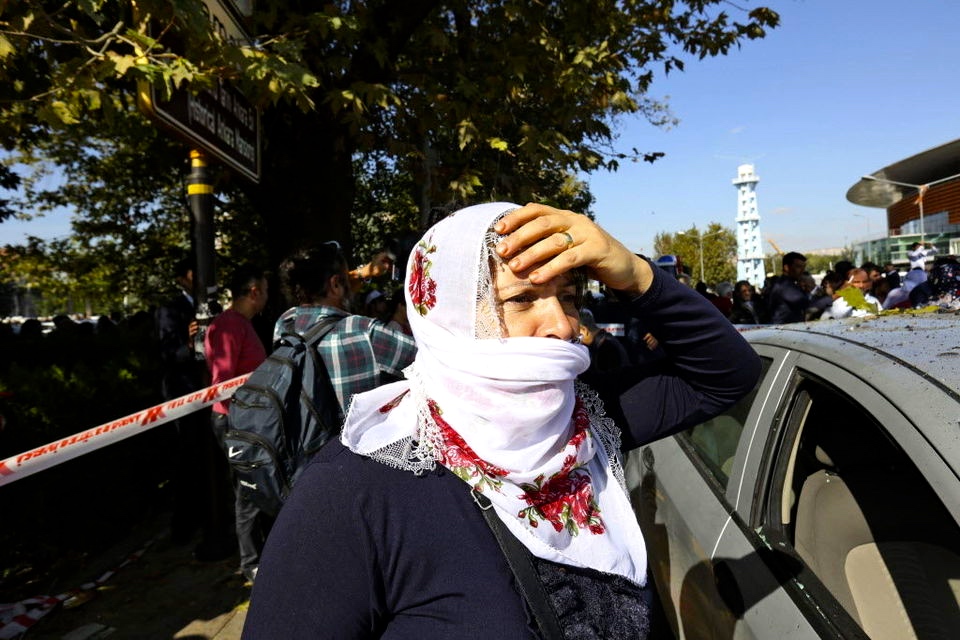
Thousands of Turkish citizens gathered in central Ankara a day after twin bombings targeted a peace rally in the city, killing over a hundred civilians in an attack that demonstrators and mourners blamed squarely on the government of the Turkish president, Recep Tayyip Erdoğan.
Witnesses and victims’ families, as well as opposition parties, ascribed direct responsibility to the government for allegedly failing to provide any security measures ahead of the peace rally, saying police officers who arrived at the scene after the bombing fired teargas at grieving families who rushed there to inquire about their loved ones.
They also blamed Erdoğan’s government for allegedly sowing chaos ahead of next month’s parliamentary polls, either to delay the elections and retain power for his ruling Justice and Development party (AKP), or to increase his chances of securing a broader majority in the elections to maintain security.
“We are grieving, we are saddened, but we are also furious,” the Kurdish opposition leader, Selahattin Demirtas, told a rally in Sihhiye Square in central Ankara. “We will struggle, fight, and win back the democracy.”
Demonstrators shouted slogans condemning the Turkish president, chanting “chief and murderer Erdoğan” and “death to fascism.”
Brief scuffles earlier broke out as police used teargas to prevent people from laying red carnations at the site of the attack, the deadliest terrorist strike on Turkish soil in recent history. The pro-Kurdish People’s Democratic party (HDP) said said some members of its delegation sustained injuries.
Organizers searched the demonstration’s attendees and patted them down to avoid a repeat of the previous day’s attack as tension and anger rose at the previous day’s bloody events.
According to the HDP, the number of people killed in the bombing stands at 128, all but eight of whom have been identified and their names published by the HDP’s crisis desk.
No group immediately claimed responsibility for the bombing, and the government has denied any part in it. The prime minister, Ahmet Davutoğlu, cited the political upheaval in both Turkey and Syria and said the attack could have been carried out by Islamic State, Kurdish militants or radical leftist groups.
Witnesses and victims’ families on Sunday said the police had not provided any protective measures for the peace rally, which had called for an end to recent bouts of violence that had gripped Turkey and was mostly attended by leftist, Kurdish and Alevi activists.
Outside Numune Hospital in central Ankara, families of victims treated at the hospital reiterated their blame for the government and its lax security, and said they were attacked with tear gas as they rushed to the scene for news of their loved ones.
One man who said he learned of his nephew’s death in the bombing on Facebook said he was tear-gassed after arriving at the site of the bombing by police.
“These are our children and they would not let us help them,” he said. “I saw arms, legs and heads severed from their bodies.”
Security analysts have pointed out the similarities to a suicide bomb attack in the Turkish border town of Suruç that killed 33 Kurdish and Turkish activists in July, which the Turkish government blamed on Isis.
The government announced it had appointed two chief civil inspectors and two chief police inspectors to investigate the Ankara attack. According to the pro-government daily Yeni Safak, one of the suicide bombers might have been identified as a man aged between 25 and 30, but no further details have yet been made public.
The two explosions occurred in an interval of a few seconds near the central train station on Saturday morning as thousands started to gather for a peace march, which was organised by several leftwing groups including labour unions and the HDP to call for an end to the escalating violence between the Turkish government and the outlawed Kurdistan Worker’s party (PKK).
Selahattin Demirtas, the co-chair of the HDP, held the government responsible for the attack and said his party, seen as one of the main targets, would not seek revenge but would ask for justice.
The government accused the Kurdish politician of exploiting the pain of others for electoral gain. On Sunday, at the memorial rally, Demirtas harshly rebuffed these claims.
“Who are you to keep threatening us? We will not allow you to kill us like this, day after day. We are the ones who are dying. We are the police, the soldiers, we are the Kurds and the Turks who are dying. Your children are not the ones that are killed,” he said. “That is why we are not the ones who should be held responsible, but you are.”
The bomb attack in Ankara came three months after the breakdown of a mutual ceasefire between the Turkish government and the PKK. Hundreds of people have been killed in the escalating violence since then.
Hours after the Ankara bombing, the PKK announced an expected unilateral ceasefire, in order to avoid acts that could obstruct a “fair and just election” on 1 November. The snap vote was called after the government failed to form a coalition following national elections in June.
The Turkish government opted to snub the offer of calm. On Saturday night, Turkish fighter jets launched airstrikes against PKK positions in Turkey and northern Iraq. A statement by the general chief of staff said 49 militants were killed and shelters and gun positions were destroyed. Security operations were also reported from the predominantly Kurdish province of Diyarbakir.
3 WAYS TO SHOW YOUR SUPPORT
- Log in to post comments














